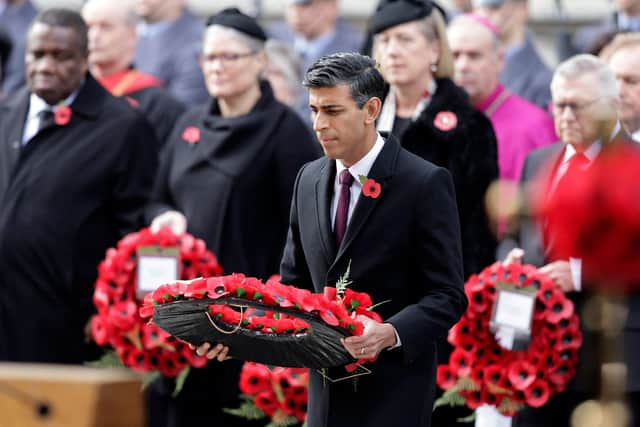Young people need to learn why Armistice Day is important - Bill Carmichael
I knew from the occasional hints he would drop, and the medals he never once wore - the Atlantic Star, the Pacific Star, the Italy Star and the Africa Star - the war theatres where he saw action.
But it was frustrating for me, a child like many of my generation brought up on wartime stories of derring do, that he flatly refused to give me any details except to say that war was “bloody terrible”.
Advertisement
Hide AdAdvertisement
Hide AdOne time we were watching a history programme on TV and it mentioned the Siege of Tobruk in 1941, when a small allied garrison faced the might of Erwin Rommel’s German army in north Africa, and my dad said quietly: “I was there.” But he would say no more.


This all changed in the months before his death, when he revealed some horrific stories of his wartime experiences. I suspect he knew what was coming and wanted to unburden himself.
He recounted a U-Boat hunting mission in the Bay of Biscay in 1944 when a stricken German submarine surfaced right next to my dad’s ship. The sub’s hull had been split by depth charges and German submariners were jumping into the sea.
More than 30 men were rescued by the Royal Navy - but not all. As the U-Boat finally sank there were still men on the ladder trying to get out, and my father was close enough to see their faces as the sub went down. It was an image that would haunt him for the rest of his days.
Advertisement
Hide AdAdvertisement
Hide AdOn another occasion a young sailor, still a teenager, joined my dad’s ship after he had miraculously survived when his previous vessel had sunk, drowning almost the entire crew.
Instead of congratulating him on his good fortune, his new shipmates greeted the newcomer as an omen of bad luck.
My dad explained that many of the crew, superstitious as sailors often are, believed the sea had claimed the young man, and would never let him go, and one day the sea would be back to take him again.
Traumatised by his near death experience, the young sailor suffered a complete nervous breakdown. He stopped eating, talking or sleeping, spending each night quietly moaning to himself. He stopped washing and stank, and was incapable of carrying out even the simplest of tasks.
Advertisement
Hide AdAdvertisement
Hide AdAfter days of torment he hanged himself and was buried at sea. As his shipmates had predicted, the sea had indeed returned to claim its own.
When I buy a poppy at this time of the year I think of my dad, and my mum who survived the Luffwaffe’s bombing blitz, and my grandfathers who both served in World War I, and of those doomed German submariners, and of that young man who ended his own life.
Many on the Left like to portray Remembrance Sunday, and the wearing of poppies, as a glorification of war; a type of jingoistic nationalism of the worst kind.
They couldn’t be more wrong. Instead, wearing a poppy is a respectful act of remembrance for all who suffered in war, and a thanksgiving for that gilded generation whose immense sacrifices defeated Nazism, and who made life better for all, not just those in the UK.
Advertisement
Hide AdAdvertisement
Hide AdWe owe them an immense debt of gratitude for the peace and prosperity that most of us have managed to enjoy for most of our lives. That’s what the poppy means to me and, I am sure, many others.
So it is both sad and worrying to see a new breed of fascism raising its head across the West.
Ever since the October 7 pogrom, in which more than 1,400 Israeli civilians were murdered for simply being Jewish, we have had to put up with mobs of mainly young people taking over our city centres and shouting support for a bunch of racist baby-killers who are no better than the Nazis we defeated almost 80 years ago.
If they had a shred of common decency they would call off the demonstrations planned for tomorrow, which is Armistice Day, and Remembrance Sunday, out of respect for those mourning lost loved ones.
Advertisement
Hide AdAdvertisement
Hide AdBut decency isn’t a quality much in evidence on those demonstrations, and I expect the protests to continue.
I can only hope the police are strong and determined enough to prevent desecration of war memorials.
As for my dad, in some ways I am glad he is not around to witness what his country has become.